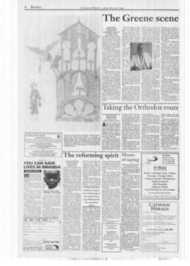Page 7, 26th August 1994
Page 7

Report an error
Noticed an error on this page?If you've noticed an error in this article please click here to report it.
Tags
Share
Related articles
"i Respectfully Salute You
`i'm Off To Light A Small Fire Under The Fool Reagan'
Charterhouse Chronicle
Incidental Rudeness Of The Great Novelist
" It Is The Supernatural Screen That Matters-not Whether...
Write to the heart of the matter?
ASANY ENGLISH teacher will tell you, this entury has only produced two great Catholic novelists Evelyn Waugh and Graham Greene.
But we can't even be sure about this now. According to one new biographer, Graham Greene never "took Catholicism seriously as a religion devoted to the principles of Jesus Christ".
Indeed the book goes on to say that Greene "in a sense turned the Catholic religion into a cult of evil".
The biographer making these hostile claims is Michael Shelden, a youngish professor of English at Indiana University who has already published bestselling biographies of Horizon editor and literary darling Cyril Connolly and Animal Fa r m author George Orwell.
Indeed it was while working on Orwell that he noticed a bitter review the tireless socialist had written of Greene's African novel The Heart of the Matter.
In it, Orwell, who had served in Africa as a colonial policeman, argued that Greene's portrayal of the continent was unrealistic and added, acidly,that" the whole thing might as well be happening in a London suburb".
Michael Shelden was struck by this observation. It seemed, in his eyes, to "make sense with my own knowledge of The Heart of the Matter".
He adds, "I always felt that what I know about Greene was slightly suspicious. There were things about Greene that just did not add up, and his Catholicism didn't ring true at all".
Ile felt that it was now time, after the first installment of Norman Sherry's official biography, to "reconstruct Greene".
This reconstruction was severely limited. Though he managed to speak both to Greene's wife and to his long-term French mistress, Shelden tells me that he was forbidden by Greene's estate to quote from any of his published and unpublished works.
He did, however, gain
As a novelist, he found the Catholic Church a wonderful source of material. "Every novelist needs props, an atmosphere. The Catholic . Church", says Shelden, "is blest with props. Of all the Christian Churches, the Catholic Church provides the greatest atmosphere".
access at Catholic Georgetown University to all the "revealing and stunning" letters from Greene to his American lover Catherine Walston. Unsurprisingly, Mrs Walston plays a starring role in Shelden's biography.
From the Information he has accrued, Shelden draws a disturbing and startling portrait of the novelist's religion.
Greene converted to Catholicism shortly after leaving Oxford. He joined the Church because he was desperate to marry a young Catholic girl called Vivien.
"He saw the Catholic Church as a way to get into Vivien's heart", says Shelden. Exploiting Vivien's Catholicism to the full, Greene threatened to commit suicide if she refused to marry him.
As Shelden notes "if she refused to marry him she would therefore be responsible for a fellow Catholic having endangered his mortal soul".
But Catholicism held other attractions too. For someone as naturally rebellious as Greene, conversion was an opportunity to appear exotic and to decry the drab Anglicanism of his youth.
And as a novelist, he found the Catholic Church a wonderful source of material. "The Catholic Church", says Shelden, "is blest with props. Every novelist needs props, an atmosphere. Of all the Christian Churches, the Catholic Church provides the greatest atmosphere".
Greene once wrote that he "had to find a religion..to measure my evil against". His three greatest novels Brighton Rock, The Power and the Glory and the Heart of the Mattter, are imbued with a heightened sense of damnation that, Shelden believes, could only come from a Catholic.
Greene also loved to play the role of great Catholic novelist, and the Church loved him in turn for it. For Greene "being a Catholic novelist was beneficial, it gave him a way of gaining recognition.".
It is rare to find serious modern writers advertising their religious belief. Shelden believes that Catholics adored Greene for the very reason that he offered "a certification of the
intellectual respectability of Catholicism".
That is why, in Sheldenis eyes, "there is still very little serious questioning of Greene as a Catholic novelist". Believing we should, Shelden litters his biography with evidence to support his central thesis that "there are no Catholic dimensions to Greene other than when he used Catholicism to enhance his sense of evil".
On a personal level, it is pretty clear that Greene was no saint. Throughout his life he had a strange and complex sex life, which incorporated prdstitutes,
homosexuality and masochism. He was obsessed with drugs, and smoked opium right up to his death. He once suffered a haemorrhage through his heavy drinking. His antiSemitism was blatant, he volunteered to spy against his country and daily flirted with suicide.
But nobody expects our greatest novelists to behave properly and, as Shelden argues "trying to find moral excellence in his life is not a
helpful way to honour hint".
A far more damaging charge is that Greene was, in essence, profoundly antiCatholic; in his novels he "takes something that people hold sacred and ridicules it".
Greene felt that, as a novelist, one great advantage of religious faith was that it created a heightened sense of evil.
His small collection of religious writings are noticeably lacking in references to God and love; instead they seem unnaturally obsessed with sin and damnation.
Take his greatest novel, Brighton Rock, a story of gang warfare set in the seaside resort and described by Shelden as "a portrait of evil that is unparalleled in modern literature".
The story centres on Pinkie, a young gangster contemptuous of religion and obsessed with hell. In Shelden's mind, readers expected Brighton Rock to be a Christian tale about God's infinite mercy; one Jesuit reviewer confidently asserted that Pinkie's "malevolence discloses, in a paradoxical way, the grace for which he hungers".
But where is this hunger? Too proud to seek repentance, a doomed Pinkie kills himself, echoing T.S. Eliot's idea that "damnation itself is a form of salvation from the ennui of modern life, because it at last gives some significance to living".
In short, Greene tries to transform the devil ( Pinkie) into a heroic spiritual character. This is why Shelden describes Greene's novels as "gleefully blasphemous".
After portraying the priest in his 1940 novel The Power and The Glory as a drunken failure, Greene received an angry missive from Cardinal Pizzardo exhorting him "to be more constructive from a Catholic point of view".
'According to Shelden, this was the "one moment in Greene's life when he was truly shaken by something. He would be unmasked as a Catholic who did not take his religion at all seriously".
Needless to say, he made a quick apology to the Cardinal. The Church was still stuck with him.
blog comments powered by Disqus











